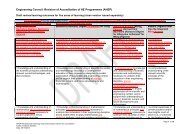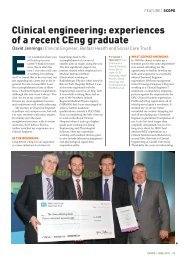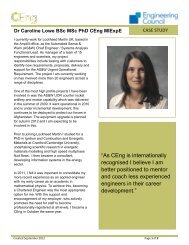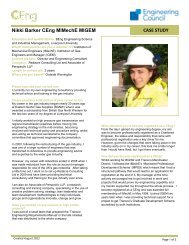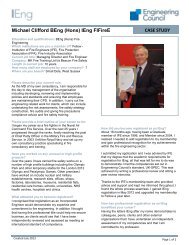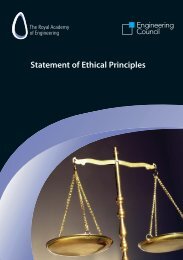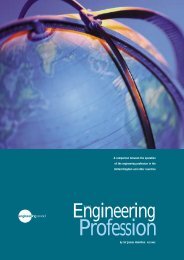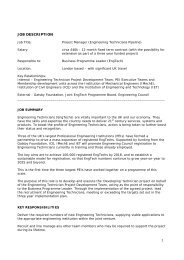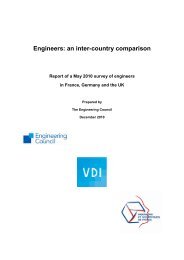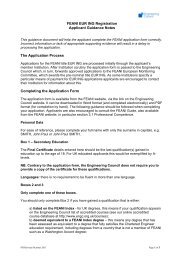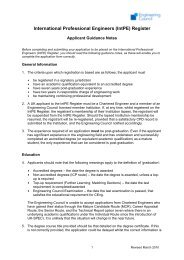An Engine for Change - A Chronicle of the Engineering Council
An Engine for Change - A Chronicle of the Engineering Council
An Engine for Change - A Chronicle of the Engineering Council
You also want an ePaper? Increase the reach of your titles
YUMPU automatically turns print PDFs into web optimized ePapers that Google loves.
1996-1998: THE RUDGE YEARS 125candidate. The term was subsequently endorsed, emphasising that it would havedemonstrably to bring <strong>the</strong> candidate to <strong>the</strong> appropriate exemplifying standard.Entry RequirementsA fur<strong>the</strong>r provision taken over from ‘Competence and Commitment’ was that <strong>of</strong> specifyingminimum entry requirements to accredited courses - <strong>the</strong>re was mounting evidence that someuniversities, to meet <strong>the</strong>ir requirements <strong>for</strong> funding, had dropped <strong>the</strong>ir entry standards toextremely low levels, resulting in large drop-out rates or dubious output standards. Theexemplifying entry standards in SARTOR 3 were declared as:<strong>for</strong> MEng courses 24 ‘A-Level’ points equivalent to 3 grade B passes;<strong>for</strong> BEng(Hons) courses 18 ‘A-Level’ points equivalent to 3 grade C passes;<strong>for</strong> degree courses leading to Incorporated <strong>Engine</strong>er, 11 ‘A-Level’ points.The entry standard requirement turned out to be by far <strong>the</strong> most contentious provision in <strong>the</strong>new SARTOR with around 80-90% <strong>of</strong> <strong>the</strong> comments and objections being related to this.When <strong>the</strong> university Vice Chancellors were invited to consider <strong>the</strong> SARTOR97 draft, onlysix out <strong>of</strong> about 100 were in favour. However, a prior copy sent <strong>for</strong> comment to <strong>the</strong> DTI [still<strong>the</strong> EngC sponsoring Government Department] had elicited only one observation - <strong>the</strong>specified entry standards <strong>for</strong> IEng were too low! The Royal Academy <strong>of</strong> <strong>Engine</strong>ering alsoindicated broad support in a letter <strong>of</strong> 24 February 1997.All those universities that felt <strong>the</strong>ir students would not meet <strong>the</strong> requirements – and <strong>the</strong>rewere many <strong>of</strong> <strong>the</strong>m, especially <strong>the</strong> <strong>for</strong>mer polytechnics – argued, <strong>for</strong> example, that studentsfrom deprived backgrounds should be given a chance and that judgement should be made onoutput ra<strong>the</strong>r than input standards. This sounded persuasive until <strong>the</strong> practicalities wereconsidered.The IWG continued its work in <strong>the</strong> teeth <strong>of</strong> opposition but to help meet such pointsSARTOR-3 policy was modified on <strong>the</strong> basis <strong>of</strong> creating a “teachable group”. This was aterm introduced by Dr Judith Secker to denote a group <strong>of</strong> students <strong>of</strong> sufficient academicstrength to be able to assimilate <strong>the</strong> material at <strong>the</strong> necessary rate, yet allowing some latedevelopers to participate. Accordingly a “teachable group” was defined as one where at least80% <strong>of</strong> <strong>the</strong> class reached <strong>the</strong> exemplifying entry standard. The o<strong>the</strong>r 20% could be admittedat <strong>the</strong> discretion <strong>of</strong> <strong>the</strong> university and would not affect <strong>the</strong> case <strong>for</strong> accreditation. Also, to givetime <strong>for</strong> university engineering departments to acclimatise, <strong>the</strong> 80% rule was phased in,beginning with 50% <strong>for</strong> <strong>the</strong> 1999 entry.The <strong>Engine</strong>ering Pr<strong>of</strong>essors’ <strong>Council</strong> (EPC) was, at best, ambivalent about setting inputstandards, many <strong>of</strong> <strong>the</strong>ir members coming from <strong>the</strong> post-1991 universities – <strong>the</strong> <strong>for</strong>merpolytechnics where, in general, student aptitude as measured by ‘A’ Level grades was lowerthan that accepted by <strong>the</strong> older universities. EPC members voiced <strong>the</strong> view that <strong>the</strong> emphasisshould be on output standards - though that <strong>of</strong> course was part <strong>of</strong> <strong>the</strong> purpose <strong>of</strong> <strong>the</strong>accreditation process. The EPC established a working party to develop an output standardsapproach and over <strong>the</strong> next few years produced a number <strong>of</strong> perceptive and useful paperswhich complemented SARTOR-3.© <strong>Engine</strong>ering <strong>Council</strong> UK 2004



